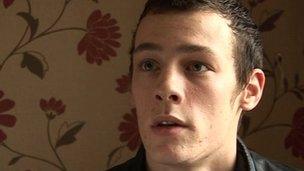Hacker Chris Hardy gives online safety advice
- Published
A computer hacker from Cumbria says people should be more cautious about how much information they put online about themselves.
Chris Hardy, 22, from Whitehaven, pleaded guilty to fraud by false representation in August and was sentenced to 120 hours' unpaid work and costs.
Hardy hacked into an email account by using information on that user's Facebook page to figure out answers to security questions.
Once he gained access to the email account, he was able to reset that user's Facebook password and gain access to that.
Using chat instant messaging, he convinced one of the user's friends to hand over their credit card details.
He told BBC Inside Out North East that people needed to be more careful about who they communicated with online.

Chris Hardy says people must be cautious about how much information they share
He said people should hide their email addresses and urged them not to put "too much information" on their profiles and timelines.
"Accounts are getting hacked every day so you don't really know who is on the other end, it could be anyone, it could be someone wanting your bank account details," Hardy added.
"I keep an eye out for people like that. I never give bank details over the internet, I don't keep my email address on Facebook.
"There is an option to hide your address and that will stop people knowing your email address and hacking into your Facebook account."
Chief Constable of Cumbria Police, Stuart Hyde, is the Association of Chief Police Officers (ACPO) lead for e-Crime Prevention.
With so-called superfast broadband looming for Cumbria, Mr Hyde also urged people to be cautious about the information they put online.
'Computer front door'
"[New broadband] almost automatically will bring with it a higher risk of crime, more opportunities for people to have their details stolen if they don't take basic precautions to become subject of scams or identity theft," he said.
"Nationally, I'm leading a piece of work to look at all of the training we give to officers up and down the country on how to investigate cyber crime, how to prevent it and how to help people to help themselves to become more secure online.
"You wouldn't leave your front door open, so why leave the front door open of your computer?
"A digital lock - whether it's a password or some other way - it's another way to stop free and easy access to your information and is just as important as shutting your front door."
Tuesday marks the 2012 Safer Internet Day, an annual event designed to encourage people to use internet technology, including mobile devices, more responsibly.
This year it coincides with the week-long BBC Share Take Care campaign, in partnership with the UK Safer Internet Centre, which is being featured across BBC television, radio and websites to raise awareness of issues surrounding safeguarding reputation online.
You can see the full Inside Out episode on the iPlayer for seven days.
- Published7 February 2012